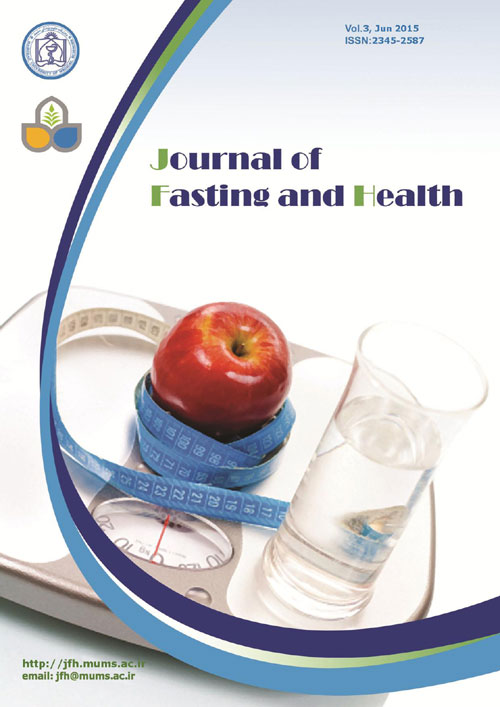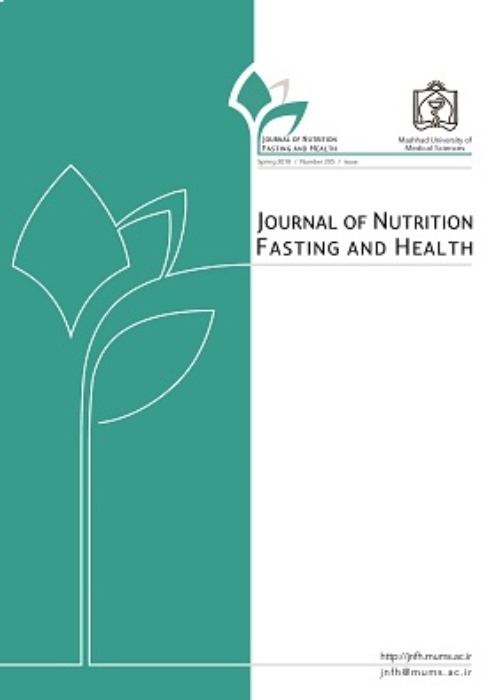فهرست مطالب

Journal of Nutrition, Fasting and Health
Volume:3 Issue: 2, Spring 2015
- تاریخ انتشار: 1394/05/29
- تعداد عناوین: 8
-
-
Pages 50-53Fasting is a form of Islamic worship to approach God. There is a direct relationship between fasting, abstaining from eating and drinking, and an individual’s health as well as his ill-health. Therefore, it is of utmost importance in the Islamic perspective to weigh the spiritual benefits achieved through fasting against its probable harmfulness to an individual’s health. Regarding fasting, the Islamic perspective is based on spiritual and social goals whose achievement centers around fasting according to the Islamic principles. But, in medicine, fasting is merely dealt with abstaining from eating and drinking which is regarded as one aspect of this Islamic ritual. Additionally, the concept of harmfulness is defined as making a defect or disorder occurring in the body, the recognition of which is within the responsibility of medicine and the decision about which is within the responsibility of an individual. Medical science can determine the effects and consequences of thirst and hunger during the month of Ramadan. In the religious perspective, it has been emphasized that fasting is for achieving the divine virtue, and this shouldn’t be in conflict with maintaining man’s health. Therefore, the conditions in which there is the probability of harmfulness to man’s health due to fasting, man shouldn’t fast. As a result, medical science could recognize the conditions in which there is probable harmfulness to man’s health.Keywords: Benefit, Fasting, Harmfulness, Ill, health, Spirituality
-
Pages 54-54Based on current demographic, Muslims represent close to 1.7 million which constitutes about 24% of the world population. About sixty seven percent of them are above 15 years of age and is probably fasting during the month of Ramadan. Therefore more than 1.1 billion Muslims are fasting in this year of Ramadan, because it is obligatory for adult Muslims to abstinence from food, fluids and sexual activity during the day time in this month. Due to changes in eating habit and sleeping timings, physiological changes could occur in fasting person. Recently many clinical and observational studies have been conducted all over world to observe those changes.Studies are being published and outcomes are being presented international conferences. Few international conferences have been organized to gather the scientists involved in such studies. We are pleased to organize this important conference, under the guidance of Prof. Syed Muhammad Tariq Rafi, Patron-in-Chief of the Conference and Vice Chancellor of Jinnah Sindh Medical University, to share and learn from the experiences of international delegates who will be participating in this event.This conference will be held on Friday - Sunday, 9th - 11th October 2015, corresponding 26th – 28th Dhul Hijjah 1436 H, at Jinnah Sindh Medical University, Karachi, Pakistan.The theme of the conference is ‘Ramadan leading to better life’. This event will be jointly organized by three institutions of Karachi, namely; Jinnah Sindh Medical University, Baqai Institute of Diabetology and Endocrinology and Sir Syed Institute of Diabetes and Endocrinology. This conference will also focus on the scientific evidence towards the impact of Ramadan fasting on human health.Speakers from Malaysia (Prof. Mafauzy Mohamed), Turkey (Abdul Bari Bener), Iran (Prof. Fereidoun Azizi and Dr. Mohsen Nemati), United Arab Emirates (Mohamed Hassanein), Egypt (Prof. Adel A El-Sayed) and Saudi Arabia (Prof. Khalid Al-Tayeb) have already consented to participate.The inauguration session will be held in the evening of Friday, 9th October 2015. Prof. Mukhtar Ahmed, Chairman Higher Education Commission, Islamabad; and Mufti Muhmmad Taqi Usmani, Ex-Chief Justice, Sharia Court of Pakistan have consented to be Chief Guest and Guest of Honor, respectively for this Conference. The scientific sessions will be held on Saturday-Sunday, 10th - 11th October, 2015. They will be comprised of five sessions: three will be assigned for the ‘Diabetes and Endocrinology’ and two will be allotted for ‘other than diabetes’. The diseases ‘other than diabetes’ will cover Cardiovascular, Nephrology, Obstetrics & Gynecology, Stroke, Gastroenterology, Pulmonolgy, Hepatology, Dentistry, Heat Stroke and Sports Medicine.Weather of Karachi will be very pleasant in the month of October. We cordially invite all the interested delegates to come to Karachi and attend this important International Conference.
-
Pages 55-57Aimwe conducted this study to investigate the role of Ramadan fasting on oxidative stress.Materials And Method23 people (16 male, 7 female) aged between 25 and 65 years were recruited in this study. 10cc Venous blood samples were taken after 8- to 10- hours fasting on 2 different times: a week before Ramadan and at the end of Ramadan (day 27). Portions of the serum samples were used immediately to measure prooxidant-antioxidant balance (PAB).Resultsthe changes of oxidative stress was not significant in control group. Moreover, these changes also were non-significant in both gender. Oxidative stress was significantly increase in patients with CAD during Ramadan fasting.ConclusionIt seems that Ramadan fasting does not affect oxidative and prooxidant-antioxidant balance meaningfully. However, more studies are required in this field.Keywords: Ramadan fasting, oxidative stress, prooxidant, antioxidant balance
-
Pages 58-64IntroductionAlthough fasting has many benefits for health, it can be dangerous for patients. So it is necessary that physicians have adequate information about clinical aspects of fasting and they should advice patients. Therefore in this study we analyses the condition of physicians counseling about fasting from the perspective of patients.MethodsIn this descriptive analytical cross-sectional study, patients with diabetes and hypertension who were going to doctors in Isfahan in holy month of Ramadan of 2012 and 2013 completed the questionnaires. A valid self-regulation questionnaire including patient`s satisfaction from the quality of physicians counseling about fasting (In the area of education, evaluation of the patient condition, communication /relationship with patients), caring for diseases in holy Ramadan and the incidence of symptoms in fasting had been used with = 0.76. The patients completed the questionnaire after visit. The data was analyzed by Independent t-test, chi-square, Regression, one-way ANOVA in the19 spss software.Results285 patients, 199(69.8%) female and 86(30.2%) male, were selected. The mean satisfaction score of counseling was 70.50 ±13.23. The highest score (75.36±14.16) was referred to counseling of physician, and the least score (66.09±18.84) to patient assessment by physician. Mean score of Patients'' satisfaction of specialists was higher than of general practitioner (p-value<0.0001). There were no significant differences between mean score of patients'' satisfaction and their education, age, sex, disease and disease duration. In about one-third of cases, there weren’t any conversation about Ramadan fasting. The most common symptoms during fasting were fatigue and headache.ConclusionThe quality of medical counseling for holy Ramadan in Isfahan was relatively appropriate but it is far from what is expected. It is necessary that physicians pay more attention to counseling for fasting in holy Ramadan.Keywords: counseling, diabetes, patient education, Ramadan fasting, satisfaction
-
Pages 65-73IntroductionA growing number of Muslim athletes now engage in international competition. This raises the question of the advice they should be given if a major event occurs during the month of Ramadan.MethodsA narrative review has been based upon books and extensive reviews completed by the author and other investigators.ResultsPractical considerations hamper assessment of the effects of Ramadan upon physical performance, but there seem small decreases in muscular strength and both anaerobic and aerobic capacity. Nevertheless, athletes who wish to observe Ramadan can reduce such effects by prior adjustment of diet and training plans, minimizing sleep loss, and careful management of fluid and food intake during the period of intermittent fasting.ConclusionCompetitors in most events can observe Ramadan with a small loss of athletic performance. However, intermittent fasting can endanger health for individuals with type I diabetes mellitus, and for participants in ultra-endurance events (particularly under hot conditions).Keywords: Aerobic capacity, Anmaerobic capacity, Dehydration, Hypoglycaemia, Strength
-
Pages 74-80PurposeThe aim of this study was to compare biochemical tests, body composition and anthropometric parameters in Nonalcoholic Fatty Liver Disease (NAFLD) patients before and after Ramadan fasting.Methodsfifty NAFLD patients including 33 males and 17 females aged 18-65 year, were recruited. Subjects attended after diagnosis based on ultrasound imaging, with at least 10 hour fasting, before and after Ramadan who were been fasting for at least 10 days. A fasting blood sample was obtained, blood pressure was measured and body mass index(BMI) and fat mass (FM) and fat free mass (FFM) were calculated. Lipid profile, fasting blood sugar (FBS),insulin, ALT and AST enzymes were analyzed on all blood samples.ResultThere was a significant increase in HDL-c in females and higher total plasma cholesterol, triglyceride (TG) and FBS in both gender while lower systolic blood pressure (SBP), diastolic blood pressure (DBP) and ALT decreasing after Ramadan (P<0.05, t test), the change in BMI, LDL- c, FM and FFM after Ramadan were not significant (P>0.05, t test).ConclusionThis study shows significant effects on NAFLD patient parameters during Ramadan fasting such as decreasing in insulin, ALT enzyme, SBP and DBP and increasing in HDL-c after an average of 27 d fasting, Result from this study suggested that Ramadan fasting may be useful to improve NAFLD, so further studies are needed in this area.Keywords: nonalcoholic fatty liver disease, Ramadan, Fasting, ALT, Insulin
-
Pages 81-85IntroductionAbnormal lipid profile causes maternal mortality and impairs fetal development. This study investigated the effect of Ramadan fasting on plasma lipid profile in pregnant women.Material And MethodsThis self-control, cohort study was performed in healthy volunteer fasted pregnant women. Serum cholesterol, triglyceride (TG), low density lipoprotein (LDL), high density lipoprotein (HDL), and body mass index (BMI) were measured on 0, 7th, 14th, and 28th days of Ramadan, and two weeks after Ramadan. Statistical analysis was performed by SPSS.ResultsThe mean age and BMI of participants was 26.9±6.4 year and 25±4.2 kg/m respectively. Weight and BMI of women did not change during the study. Cholesterol and LDL significantly increased during Ramadan and decreased after Ramadan (p)Keywords: Fasting, Cholesterol, High Density Lipoprotein Cholesterol, Low Density Lipoprotein Cholesterol, Triglycerides
-
Pages 86-93Maintaining weight loss after the initial phases of any weight loss intervention is a challenge. Rationally, it depends on how well the adherence is to the prescribed treatment. This study is to test the sustainability of an intervention in maintaining weight lost during Ramadan by using voluntary fasting.MethodsTwo groups of respondents (Muslim women with body mass index (BMI) ≥ 25.0 kg/m2) were randomly recruited from two states in Malaysia. One group received the Islamic based intervention (Group A) and the other received the standard intervention (Group B). The intervention consisted of three phases. The first phase was the intensive phase which was the control of food quantity intake during the fasting month of Ramadan. The second phase was the maintenance phase where the respondents were assisted to continue monitoring their food consumption using the food diary for 3 months and the third phase was the following 3 months without any assistance. The variables studied were BMI, blood pressure (systolic and diastolic pressure) and selected blood biochemical (i.e. total cholesterol (TC) and high density lipoprotein (HDL-C)). Variables were measured at baseline, at the end of Ramadan and at 6 months post Ramadan.ResultsAt 6 months post Ramadan the BMI, diastolic pressure, TC, HDL-C and TC/HDL-C ratio changes were different between the two groups (except for BMI changes where P=0.02, all others PKeywords: weight loss intervention, weight lost maintenance, adherence to treatment


